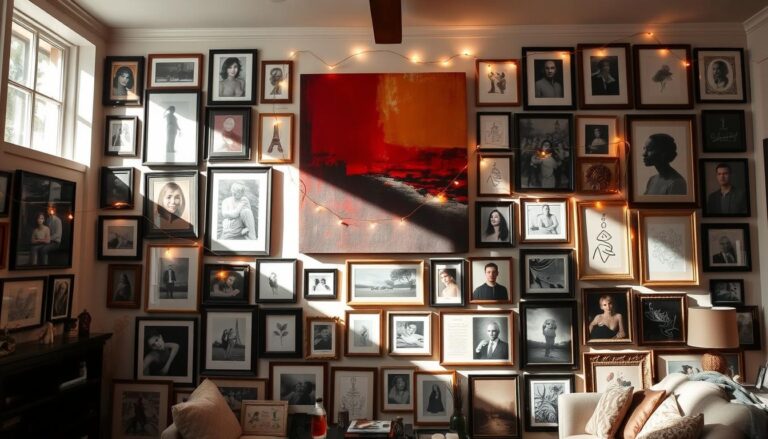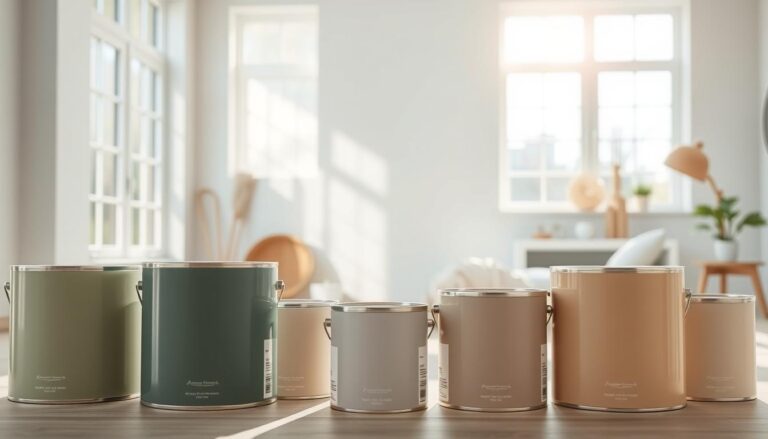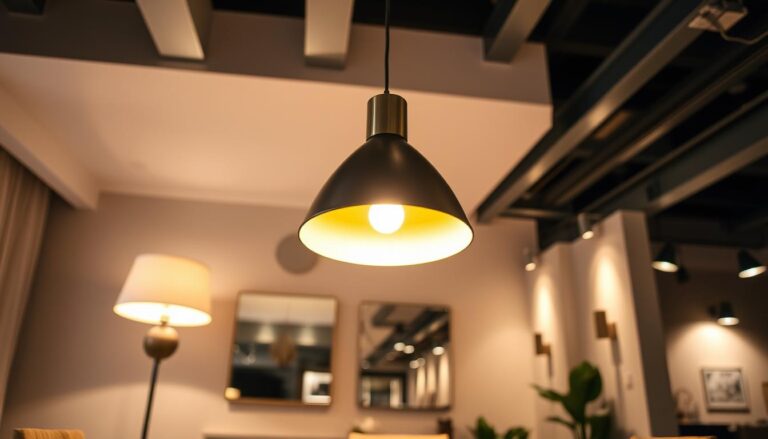Transforming your home’s interior with modern wall paneling can be a game-changer. Inspired by designers like Nicole Franzen and Wendy Labrum, you can create a unique and inviting atmosphere in your living space.
Interior wall paneling offers a versatile way to add texture, depth, and visual interest to any room. Whether you’re looking to create a cozy nook or a statement wall, wall paneling ideas can help you achieve your design goals.
Key Takeaways
- Discover the transformative power of wall paneling ideas in interior design.
- Explore various interior wall paneling styles to suit your taste.
- Learn how to incorporate modern wall paneling into your home decor.
- Get inspired by designer examples from Nicole Franzen and Wendy Labrum.
- Create a unique atmosphere with texture, depth, and visual interest.
The Transformative Power of Wall Paneling
With a rich history and diverse applications, wall paneling continues to transform interior spaces. This design element has traversed centuries, adapting to various styles and needs.
Historical Context of Wall Paneling
Wall paneling has its roots in ancient civilizations, where it served both practical and aesthetic purposes. Initially, it was used to insulate and protect walls from damage.
Evolution from Functional to Decorative
Over time, wall paneling evolved from a purely functional element to a decorative feature. Today, it is used to add character and style to rooms. Some key aspects of this evolution include:
- Advancements in manufacturing techniques
- Increased variety of materials and designs
- Growing emphasis on interior design and aesthetics
Why Wall Paneling Is Making a Comeback
In recent years, wall paneling has experienced a resurgence in popularity. This revival can be attributed to its contemporary benefits that extend beyond aesthetics.
Contemporary Benefits Beyond Aesthetics
Modern wall paneling offers several advantages, including:
- Acoustic insulation, improving sound quality within rooms
- Durability, reducing the need for frequent repairs or replacements
- Easy maintenance, as many paneling materials are resistant to dust and moisture
With the rise of diy wall paneling and decorative wall paneling, homeowners are now able to creatively enhance their living spaces. Whether through creative wall paneling designs or traditional styles, this element continues to play a significant role in interior design.
Classic Wood Wall Paneling Ideas
The allure of classic wood wall paneling lies in its ability to transform a room with its natural beauty and sophistication. For centuries, wood paneling has been a staple in interior design, offering a timeless elegance that can elevate any space.
Traditional Wainscoting Designs
Traditional wainscoting is a classic wood wall paneling idea that has stood the test of time. It typically involves installing wooden panels on the lower portion of walls, adding a touch of sophistication to rooms.
Raised Panel vs. Flat Panel Options
When it comes to wainscoting, homeowners can choose between raised panel and flat panel options. Raised panels offer a more dimensional look, while flat panels provide a sleek, understated appearance. Both styles can significantly enhance the aesthetic of a room.
- Raised panels add depth and visual interest.
- Flat panels offer a clean, minimalist look.
Shiplap and Tongue-and-Groove Options
Shiplap and tongue-and-groove paneling are other popular classic wood wall paneling ideas. Shiplap is known for its overlapping planks, creating a rustic, cozy atmosphere. Tongue-and-groove paneling, with its interlocking joints, provides a smooth, continuous surface.
Both shiplap and tongue-and-groove options are versatile and can be used in various settings, from modern to traditional interiors.
Reclaimed Wood Paneling for Character
For those seeking a unique, eco-friendly option, reclaimed wood paneling is an excellent choice. It not only adds character to a room but also tells a story through its aged, weathered appearance.
Sourcing and Preparing Vintage Materials
Sourcing reclaimed wood requires careful selection to ensure the material is both durable and visually appealing. Preparing vintage materials involves cleaning, sanding, and sometimes restoring the wood to its original beauty.
- Inspect the reclaimed wood for damage or rot.
- Clean and sand the wood to remove dirt and old finishes.
- Apply a suitable finish to protect and enhance the wood.
By incorporating these classic wood wall paneling ideas, homeowners can achieve a warm, inviting atmosphere that is both stylish and timeless.
Modern Wall Paneling Designs for Contemporary Homes
The world of interior design is witnessing a surge in modern wall paneling designs that are both functional and aesthetically pleasing. Contemporary homes are now embracing sleek and stylish wall paneling to elevate their interior spaces.
Geometric Panel Patterns
One of the trending styles in modern wall paneling is geometric panel patterns. These patterns add a dynamic touch to any room.
Diamond and Hexagonal Arrangements
Diamond and hexagonal arrangements are particularly popular, offering a unique visual appeal that can be customized to fit various interior designs.
Minimalist Panel Arrangements
For those who prefer a more subtle approach, minimalist panel arrangements are an excellent choice. These designs focus on clean lines and simplicity, creating a calm and serene atmosphere.
3D Textured Wall Panels
3D textured wall panels are another innovative option, adding depth and visual interest to walls.
CNC-Cut and Modular Systems
Techniques like CNC-cut and modular systems allow for precise customization, enabling homeowners to achieve complex designs with ease.
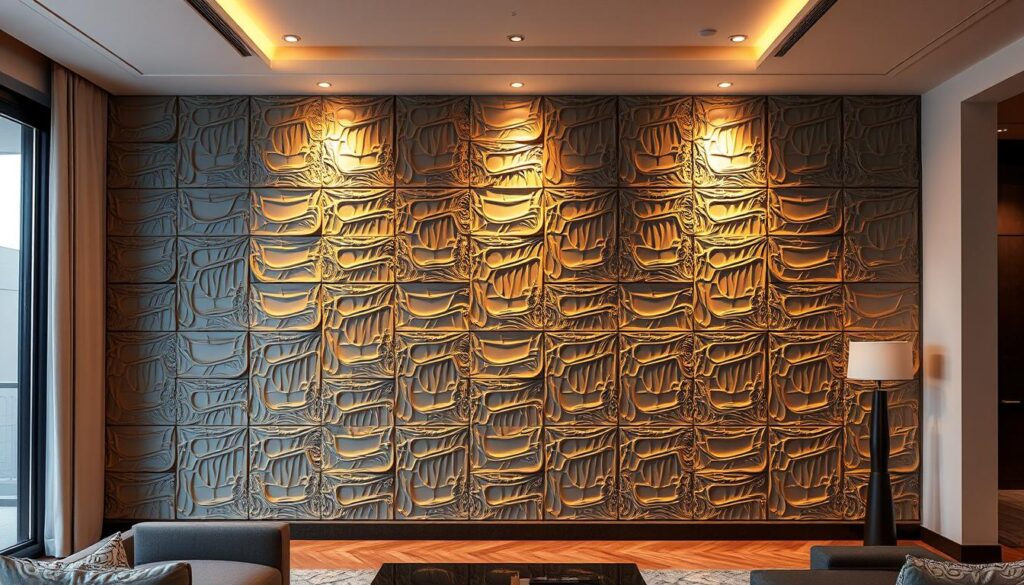
These modern wall paneling designs not only enhance the aesthetic appeal of a room but also offer a versatile solution for various interior design needs.
Creative Wall Paneling Ideas for Statement Walls
Elevate your interior design with innovative wall paneling ideas for statement walls. Creative wall paneling can transform any room, making it a stunning visual experience. By incorporating unique designs and materials, you can create a focal point that draws the eye and adds character to your space.
Accent Wall Paneling Techniques
Accent wall paneling is a great way to add visual interest to a room. By focusing on a single wall, you can create a dramatic effect without overwhelming the space. Techniques include using contrasting colors, textures, or patterns to make the accent wall stand out.
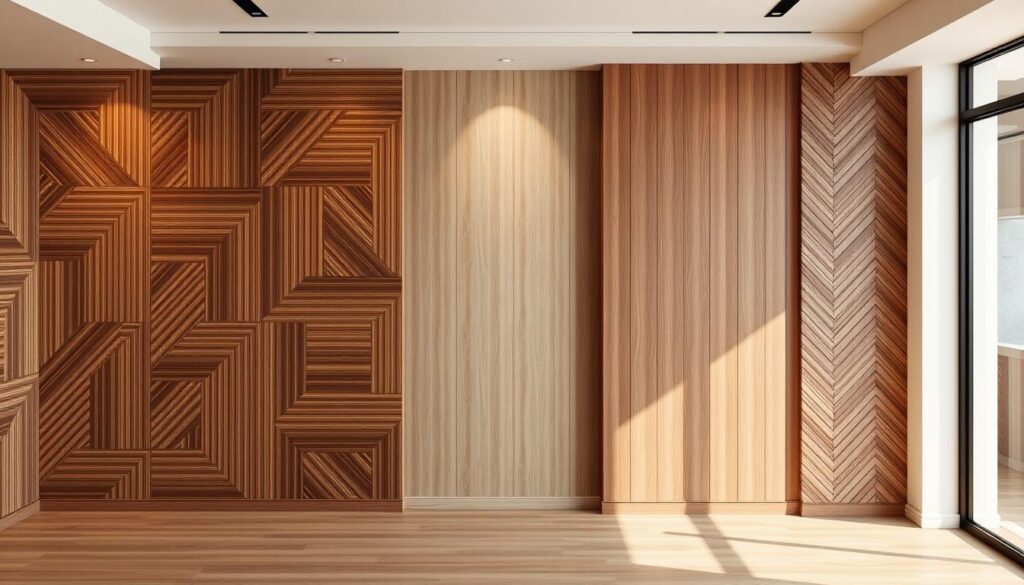
Mixed Material Paneling
Mixed material paneling combines different textures and materials to create a unique and captivating design. One popular combination is wood and metal, which blends warmth with industrial chic.
Wood and Metal Combinations
Combining wood and metal in wall paneling adds depth and visual interest. The contrast between the natural warmth of wood and the sleekness of metal creates a compelling aesthetic that’s both modern and inviting.
Artistic Panel Arrangements
Artistic panel arrangements allow for endless creativity. You can create patterns, designs, or even custom carved and sculptural panels that reflect your personal style. This approach to wall paneling turns your walls into a canvas for self-expression.
Custom Carved and Sculptural Panels
For a truly unique statement, consider custom carved or sculptural panels. These pieces can add a three-dimensional element to your walls, creating a dynamic and engaging visual experience.
Affordable Wall Paneling Solutions
Discover how to create beautiful wall paneling on a budget. Affordable wall paneling solutions are within reach, thanks to a variety of budget-friendly materials and cost-effective installation methods.
Budget-Friendly Materials
When it comes to wall paneling, the material choice significantly impacts the overall cost. MDF and composite materials offer a more affordable alternative to solid wood without compromising on the aesthetic appeal.
MDF and Composite Options
MDF (Medium-Density Fiberboard) is made from wood fibers and resin, providing a smooth surface ideal for painting. Composite materials, on the other hand, combine different materials for durability and versatility. Both options are cost-effective and can mimic the look of more expensive materials.
Cost-Effective Installation Methods
The installation method can also affect the overall cost of your wall paneling project. DIY installation can save on labor costs, and using the right tools can make the process smoother.
- Use a level to ensure straight installation
- Pre-drill holes to avoid splitting the material
- Consider using adhesive for a simpler installation
Faux Paneling Alternatives
For those on a tight budget, faux paneling alternatives can provide a similar aesthetic without the high cost. Paintable textured wallpapers are a great option.
Paintable Textured Wallpapers
These wallpapers offer texture and can be painted to match any color scheme, providing a flexible and affordable solution for achieving the look of paneling.
| Material | Cost | Durability |
|---|---|---|
| MDF | Low | Medium |
| Composite | Medium | High |
| Paintable Textured Wallpaper | Low | Low |
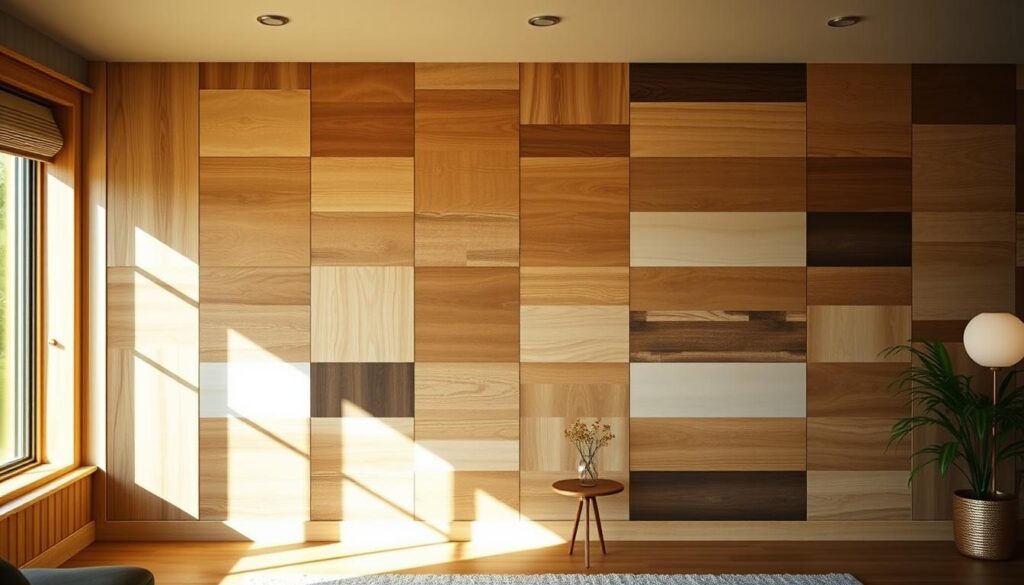
DIY Wall Paneling Projects for Beginners
Embarking on a DIY wall paneling project can be a rewarding experience, especially for beginners looking to add some character to their living spaces. With a variety of techniques and materials available, it’s easier than ever to give your walls a fresh new look.
Simple Board and Batten Tutorial
One of the most popular DIY wall paneling projects is the board and batten tutorial. This classic design involves attaching wide boards to the wall, with narrower battens covering the seams. It’s a straightforward project that requires minimal tools and materials.
Tools and Materials Checklist
- Wide boards (e.g., MDF or pine)
- Narrow battens
- Wood glue
- Nails or a nail gun
- Sandpaper
- Paint or stain (optional)
To start, measure your wall and cut the boards to size. Attach them to the wall using nails or a nail gun, spacing them evenly apart. Then, cut the battens to fit over the seams and secure them with wood glue and nails.
Easy Peel-and-Stick Panel Options
For those who prefer a less invasive approach, peel-and-stick wall panels are an excellent alternative. These panels come in a variety of designs and are easy to install, requiring no special tools or adhesives.
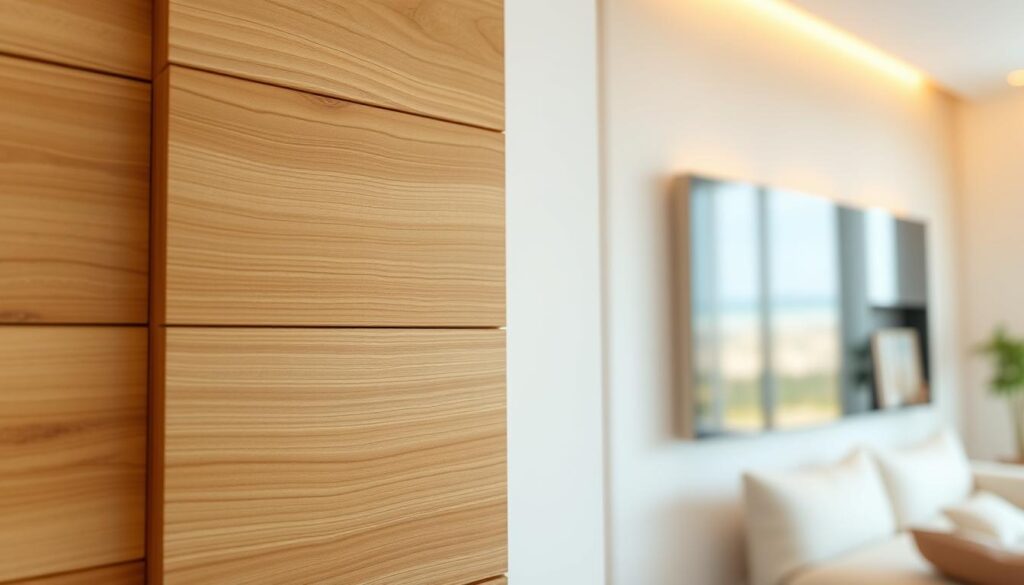
Peel-and-stick panels are perfect for renters or those who like to change their decor frequently. They can be removed without damaging the wall, making them a versatile option for DIY wall paneling projects.
Weekend Wainscoting Projects
Wainscoting is another classic wall paneling technique that can be completed over a weekend. It involves installing paneling on the lower portion of the wall, typically up to chair rail height.
Step-by-Step Installation Guide
- Measure the wall and determine the height of your wainscoting.
- Cut the panels to size using a saw.
- Attach the panels to the wall using a combination of adhesive and nails.
- Add a chair rail or molding to complete the look.
With these DIY wall paneling projects, beginners can achieve professional-looking results without breaking the bank or requiring extensive experience. Whether you choose a simple board and batten tutorial, easy peel-and-stick panels, or a weekend wainscoting project, you’re sure to enhance your interior decor and add some personality to your walls.
| Project | Difficulty Level | Time Required |
|---|---|---|
| Board and Batten | Beginner | 2-3 days |
| Peel-and-Stick Panels | Easy | 1-2 hours |
| Wainscoting | Intermediate | 2-3 days |
Wall Paneling Ideas to Elevate Your Interior Design
Elevating your interior design with wall paneling can transform a mundane space into a stunning visual experience. Stylish wall paneling is not just about aesthetics; it’s also about creating a functional and inviting atmosphere in your home.
Luxury Paneling Materials and Finishes
For those looking to add a touch of luxury to their interiors, high-end materials and finishes are the way to go. Veneer and exotic wood options are particularly popular for their unique grain patterns and rich textures.
Veneer and Exotic Wood Options
Veneer offers the beauty of real wood with greater stability and less waste. Exotic woods like mahogany and teak bring warmth and sophistication to any room. These materials can be used to create decorative wall paneling that is both elegant and durable.
Designer-Approved Panel Configurations
Designer-approved panel configurations can make a significant difference in the overall look and feel of a room. From geometric patterns to minimalist designs, the possibilities are endless. 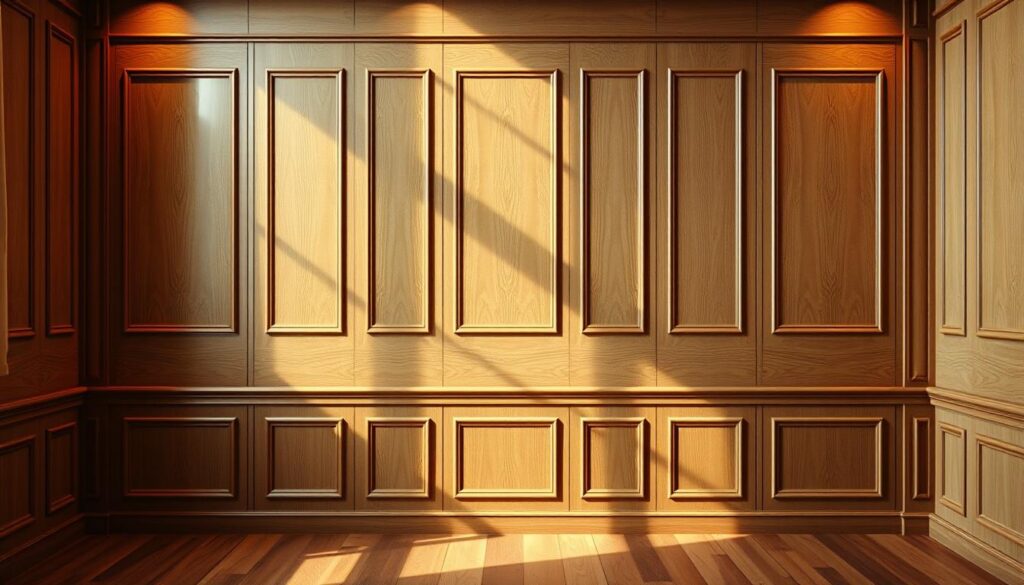
These configurations not only add visual interest but also help to create a cohesive design scheme. By choosing the right panel configuration, homeowners can enhance the wall paneling designs in their homes.
Integrating Lighting with Wall Panels
Integrating lighting with wall panels is a modern design trend that can dramatically enhance the ambiance of a room. This can be achieved through backlit or LED-enhanced panels.
Backlit and LED-Enhanced Panels
Backlit panels create a soft, ambient glow that can highlight the texture and beauty of the paneling material. LED-enhanced panels, on the other hand, offer a more contemporary look with their sleek, modern lighting solutions. Both options can add a sophisticated touch to any room.
Room-Specific Wall Paneling Ideas
Different rooms in your home call for unique wall paneling solutions to enhance their functionality and aesthetic appeal. Whether you’re looking to create a cozy bedroom, a sophisticated living room, or a practical kitchen, wall paneling can be tailored to meet the specific needs of each space.
Living Room Panel Designs
Living rooms benefit greatly from wall paneling, which can add warmth and texture to the space. Feature walls can be created using paneling to draw attention to a particular area, such as a fireplace or a large window.
Feature Walls and Full-Room Applications
For a more dramatic effect, consider applying wall paneling to all walls in the living room. This can create a cohesive and inviting atmosphere. Alternatively, a single feature wall can provide a striking focal point.
Bedroom Paneling for Coziness
Bedrooms are another area where wall paneling can be particularly effective. Paneling can add a layer of coziness and intimacy, making the room feel more relaxing.
Headboard Wall Treatments
Using wall paneling behind the bed can create a beautiful headboard wall treatment. This not only adds visual interest but also helps to frame the bed, creating a cozy nook.
Bathroom and Kitchen Paneling Solutions
Bathrooms and kitchens require special consideration due to their moisture-prone environments. Moisture-resistant materials such as PVC or tile paneling are ideal for these areas.
Moisture-Resistant Options
For bathrooms and kitchens, it’s crucial to choose wall paneling that can withstand the humid conditions. Materials like marine-grade plywood or waterproof MDF are excellent choices.
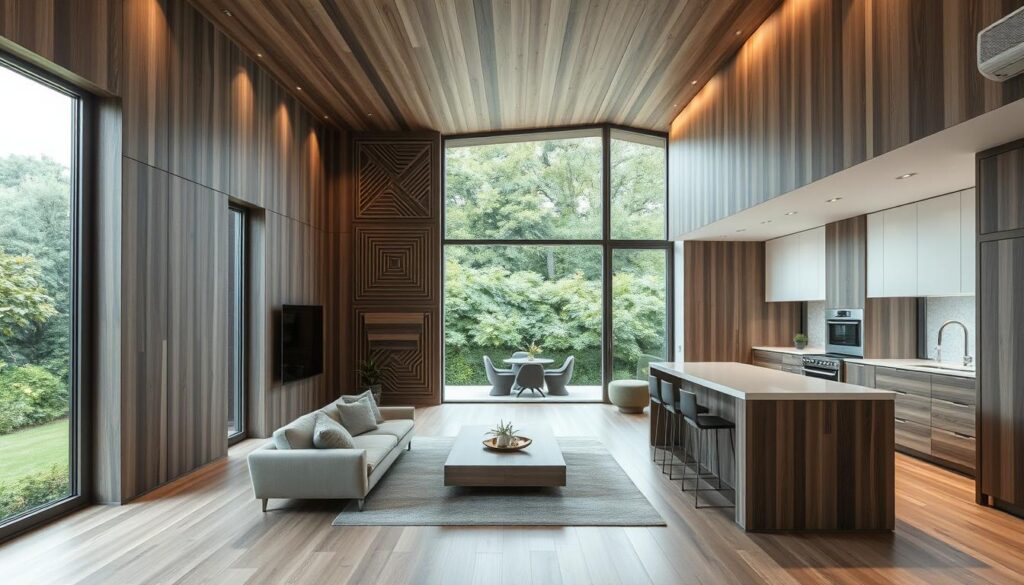
By selecting the right wall paneling for each room, homeowners can enhance the beauty and functionality of their living spaces. Whether it’s a modern living room or a cozy bedroom, wall paneling offers a versatile solution for interior design challenges.
Decorative Wall Paneling Styles from Around the World
As we journey through various decorative wall paneling styles from around the world, we uncover the beauty of cultural diversity in interior design. Decorative wall paneling has long been a significant element in architecture and interior design, reflecting the unique cultural, historical, and aesthetic values of different regions.
Japanese Shoji and Wood Paneling
Japanese interior design is renowned for its simplicity and elegance, often incorporating shoji screens made from rice paper and wood. These delicate panels not only filter light but also add a serene ambiance to rooms. Wood paneling, particularly with cedar and cypress, is also prevalent, bringing warmth and a natural feel to Japanese homes.
“The simplicity of Japanese design lies in its ability to blend functionality with aesthetics, creating spaces that are both calming and beautiful.”
European Boiserie and Ornate Designs
In contrast, European decorative wall paneling, especially boiserie, is characterized by intricate carvings and ornate details. This style, originating from France, involves elaborate woodwork that can transform a room into a luxurious space. Boiserie often features gilded details and complex patterns, reflecting the opulence of European aristocratic traditions.
French and Italian Classical Influences
French and Italian classical influences have significantly shaped European boiserie. French designs often include delicate floral motifs and curved lines, while Italian boiserie may feature more robust and intricate carvings. These styles have been influential in shaping the aesthetic of luxury interiors worldwide.
Scandinavian Simplicity in Wall Treatments
Scandinavian countries are known for their minimalist approach to interior design, which extends to their wall paneling styles. Light-colored woods and clean lines characterize Scandinavian wall treatments, creating a sense of openness and simplicity. This style is perfect for those who prefer understated elegance in their homes.
- Use of natural materials
- Minimal ornamentation
- Emphasis on functionality
By exploring these diverse decorative wall paneling styles, homeowners and designers can draw inspiration from around the world to create unique and culturally rich interiors.
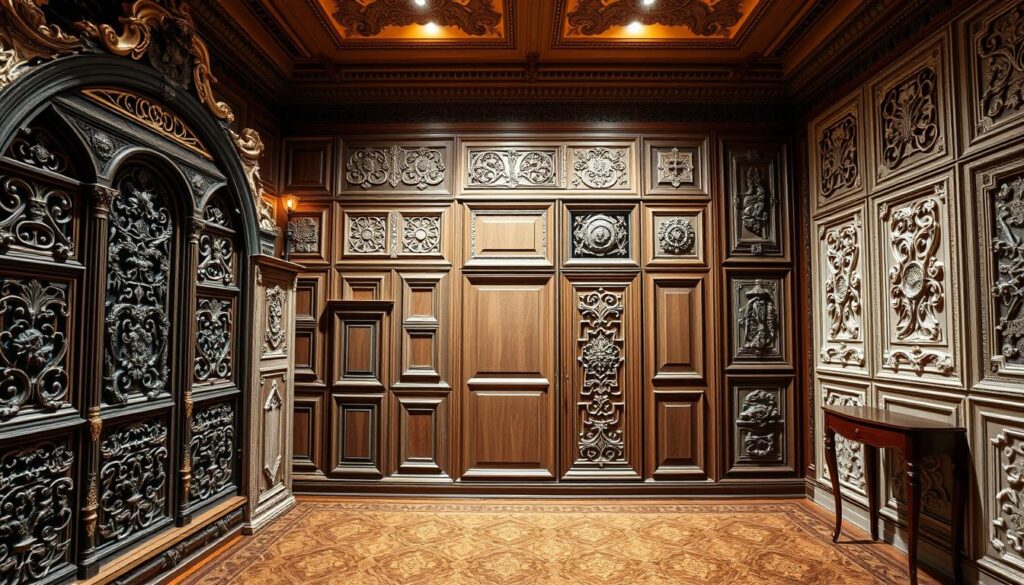
Combining Wall Paneling with Other Design Elements
Integrating wall paneling with complementary design elements is a surefire way to add depth and character to your interior walls. By thoughtfully combining paneling with other features, you can create a unique and visually appealing space.
Paneling and Wallpaper Combinations
One effective way to enhance your walls is by combining paneling with wallpaper. This mix of textures and patterns can add visual interest and create a focal point in the room. For instance, you can use paneling on the lower half of the wall and wallpaper on the upper half, or vice versa.
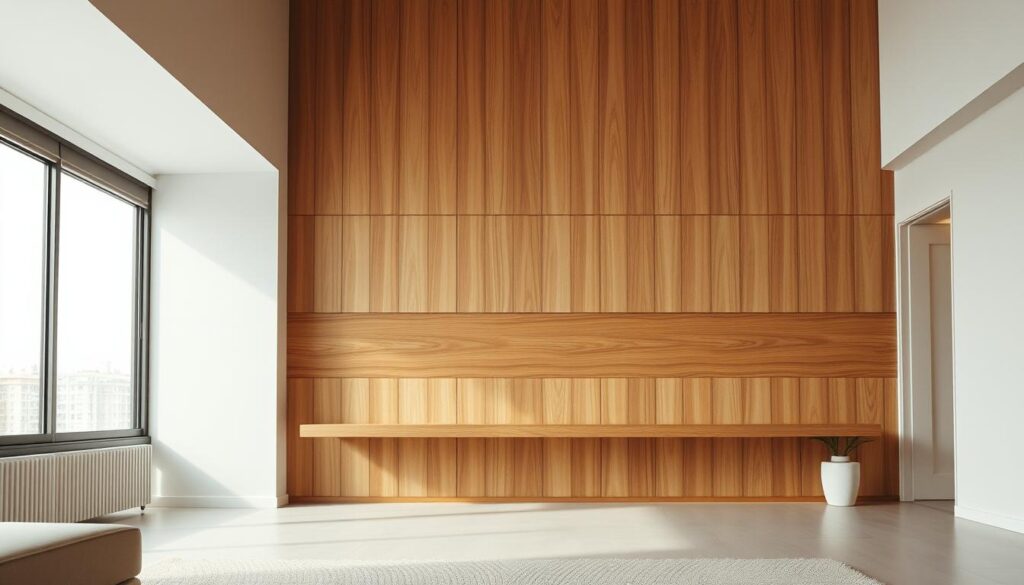
Coordinating Paint Colors with Panels
Coordinating paint colors with your wall paneling is crucial for a cohesive look. You can opt for either a monochromatic or contrasting approach, depending on your design preferences.
Monochromatic vs. Contrasting Approaches
A monochromatic approach involves using different shades of the same color for both the panels and the surrounding walls, creating a harmonious and seamless look. On the other hand, a contrasting approach uses different colors to make the paneling stand out, adding a bold statement to your interior.
Furniture Placement Against Paneled Walls
The placement of furniture against paneled walls can significantly impact the overall aesthetic of the room. It’s essential to balance the scale of the furniture with the paneling to avoid overwhelming the space. For example, placing a large piece of furniture against a paneled wall can create a cozy nook, while smaller furniture pieces can help maintain an open feel.
By carefully combining wall paneling with other design elements, you can achieve a sophisticated and inviting interior that reflects your personal style.
Maintenance and Longevity of Wall Paneling
Proper maintenance is key to extending the life of your wall paneling. Regular care not only preserves its aesthetic appeal but also ensures its durability over time.
Cleaning Different Panel Materials
Different materials require different cleaning approaches. For instance, wood paneling can be cleaned with a damp cloth, while MDF panels might require a dry cloth to prevent damage. It’s essential to identify the material of your paneling to choose the right cleaning method.
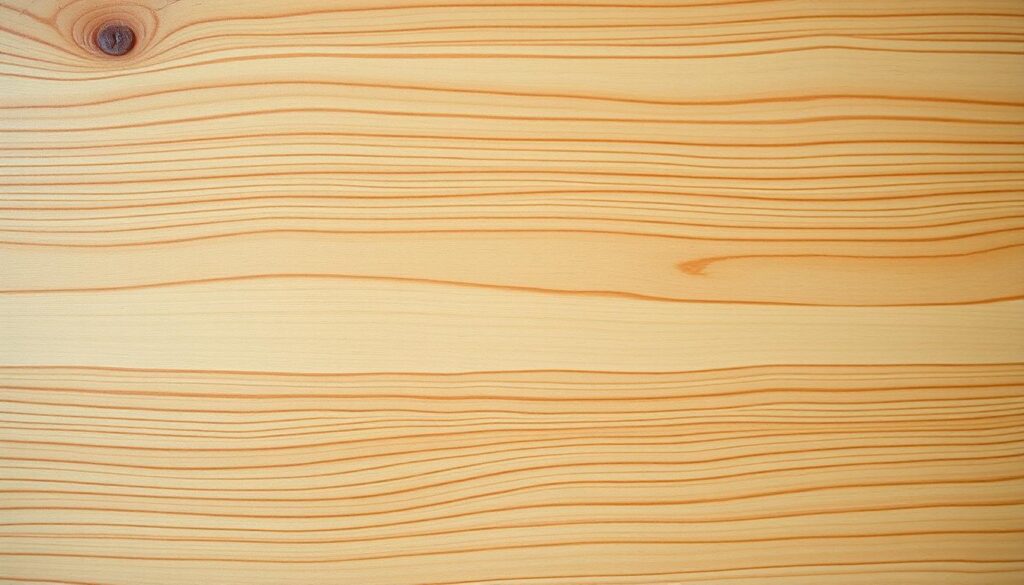
Refinishing and Refreshing Techniques
Over time, wall paneling may need refinishing to restore its original look. This can involve sanding down the surface and applying a new coat of finish. For painted panels, a fresh coat of paint can significantly refresh the appearance.
When to Repair vs. Replace
Deciding whether to repair or replace damaged paneling depends on the extent of the damage. Minor scratches can often be repaired with a touch-up, while significant damage may require replacing the panel entirely.
Protecting Panels in High-Traffic Areas
High-traffic areas require extra protection to maintain the integrity of the wall paneling. Using protective coverings or rearranging furniture to minimize wear can help prolong the life of your panels.
Conclusion: Transforming Your Space with Thoughtful Wall Paneling
Thoughtful wall paneling can transform a space, elevating its aesthetic appeal and creating a unique atmosphere. The various wall paneling ideas discussed throughout this article showcase the versatility of this design element, from classic wood paneling to modern geometric patterns.
By incorporating stylish wall paneling into your interior design, you can add texture, depth, and visual interest to any room. Whether you’re looking to create a statement wall or enhance the overall ambiance of your space, interior wall paneling offers a range of possibilities.
As you’ve seen, wall paneling ideas can be tailored to suit different styles and preferences, from traditional to contemporary. By exploring the various designs and materials available, you can find the perfect solution to transform your space and make it truly special.

